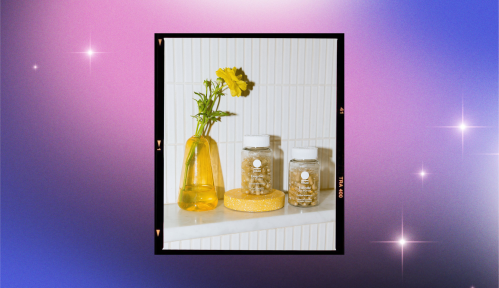Our editors independently select these products. Making a purchase through our links may earn Well+Good a commission
For as long as I can remember, seeking alternative outlets for health-care information has been a part of my sexual-wellness routine. As a queer, cisgender, white, able-bodied woman, the reason is two-fold: First, the in-school sex education I received is best explained with the face-palm emoji. And second, most doctor offices are no better. A physician once looked at me with equal parts incredulity and suspicion when I asked if very viscous discharge is normal (BTW, it is)—and don’t get me started on the awkward stammering I heard after asking another doc how to have safe queer sex.
These examples may be specific to me, but unfortunately, instances of inadequate baseline education in school, compounded by lacking treatment, information, and advice given in the doctor’s office is a too-common experience. According to a 2016 study from consultancy Prophet and GE Healthcare Camden Group of 3,000 consumers, 81 percent report being unsatisfied with their health-care experience.
If that sounds grim, it’s because it is, and perhaps it’s that very lack of patient satisfaction that’s giving way to alternative outlets for information currently gaining popularity. Below, learn more about several problems with current health-care offerings, and why the shortcomings have allowed room for Instagram and, more recently secret Facebook groups, to provide a forum and community for sharing knowledge, gaining power, and claiming personal agency.
What’s going on with our country’s sex ed?
Our sex education system is anemic, period. Let these stats sink in: “Only 13 states require that sex education is medically accurate, only 18 [are required to] teach about birth control, and 37 require that abstinence is stressed,” say Ash Spivak and Lauren Bille, co-founders of Allbodies (formerly known as Cycles + Sex), an online platform for reproductive and sexual health. Furthermore, only 9 states require discussion of LGBTQ+ identities and relationships to be inclusive and affirming, and 7 Southern states go so far as to prohibit the subject matter from curriculums.
“The current state of our sex education system is having some dire consequences,” says One Medical provider Natasha Bhuyan, MD, who specializes in women’s health. Folks are graduating from school without the information they need in order to understand their own reproductive systems or how to have safe (let alone pleasurable!) sex. The result? “Chlamydia, gonorrhea, and syphilis rates are on the rise, masturbation and pleasure is still taboo, and half of the pregnancies in America are unplanned,” she says. “To reverse these numbers, we need mandatory, medically accurate sex education on a range of topics, like consent, healthy relationships, and pregnancy prevention.”
Unfortunately, beyond school walls, health care isn’t always better and or more comprehensive.
How the system is lacking in the realm of sexual health
I’ve received false information from doctors and left interactions with medical experts feeling ashamed, and if I—again, an upwardly-mobile, white, able-bodied, cisgender person—feel this way, imagine how much worse the experiences likely are for underserved, widely under-treated minorities. For example, according to the Report of the 2015 U.S. Transgender Survey, 33 percent of trans and gender-nonconforming people report being refused care, outright, or being verbally harassed for their gender identity by a medical provider. Stats like these are hypothesized to exist for several reasons. For one, health care is downright inaccessible to many. And then, of course, there’s the issue of quality of care, which is often wanting. “Folks are going to their doctors and not being listened to, or they’re not told that it’s not okay that they have questions,” Spivak says.
And obviously, we all need and deserve consistent access to information about what is or could be going on with our bodies, including within the realms of sexual and reproductive health. And that’s where doctors should come in.
“I would love if people were able to ask their trusted primary-care physician any and all questions related to sexual and reproductive health, and that the doctor would answer; however, I am aware that many patients turn to the internet.” —Natasha Bhuyan, MD
“I would love if people were able to reach out to their trusted primary-care physician to ask any and all questions related to sexual and reproductive health, and that the doctor would answer,” says Dr. Bhuyan. “However, I am aware that many patients turn to the internet.” In fact, that’s why many organizations, including One Medical, are starting to use virtual connection points for patients—like messaging or video visits via their online portals—to provide quick access to accurate medical information. This is a step in the right direction, but the experts I spoke with agree that it’s not yet a widespread practice. And this lack of ubiquity begs the question of where people are getting the info they’re neither provided in the classroom nor doctor’s offices.
Over the last few years, Instagram accounts like Wild Flower, What’s Wrong With My Vagina, The Fat Sex Therapist, Allbodies, blkgirlmanifest, June Pilote, and more have come to my rescue because they offer information on bodies and sex that is free, sex-positive, pleasure-inclusive, body inclusive, and consent- and trauma-informed. “Lots of people are turning to the internet, which includes these types of social media outlets,” says Mark P. Leondires, MD, medical director of RMA of Connecticut and the founder of Gay Parents to Be. And Dr. Bhuyan adds that the benefit of this content is that, typically, it’s up to date.
But whether these Instagram accounts are effective with the information they provide is a complicated question to answer. From a medical perspective, some experts worry that accounts are sharing false intel or convincing people that there’s a lack of value to be gained from seeking treatment from a traditional provider. “It’s important to me that people remember that ‘Dr. Google’ or ‘Dr. Instagram’ are not always the best sources of information when it comes to your body and your health,” Dr. Leondires says. “Health information without perspective can often lead to inaccurate assumptions and conclusions. And of course there’s the risk that the information isn’t accurate at all.”
Furthermore, Spivak and Bille say Instagram itself makes it tricky for these accounts to exist period. In fact, Allbodies has been kicked off Instagram twice now—once for a photo featuring bare legs with a caption about male birth control, and anther time for a non-nude image of someone with a caption about vaginismus. “There’s no warning—they literally just shut down your account. There’s no way for you to explain that you’re an educational platform,” they say. “And on top of that, Instagram support is almost impossible to get in touch with.” (Note: At time of publishing, Instagram had not yet responded to my inquiry for an explanation of the company’s process and guidelines for this material.)
Perhaps this sense of policing the words and images people are allowed to share on Instagram (whether it’s the company’s policy or rather just perceived that way) is what’s making room for a newer social media trend: secret Facebook groups for sexual health.
Enter: secret Facebook groups
Secret Facebook groups are cropping up as online safe spaces typically started by educators and brands in the wellness space. They’re largely intended to provide information and knowledge, and to create community.
One example, the Uterati, from the founders of a body-positive period product start-up called the Flex Company, began as a private group for people with vulvas to discuss their qualms, observations, and aspirations surrounding the world of menstrual products and reproductive health care. “We started the Facebook group before we even started selling product because we had a hunch that people needed a platform to ask their reproductive-health questions,” says Lauren Schulte Wang, the Flex Company founder and CEO, adding that she would have benefited from such a forum when she was first diagnosed with late-stage HPV. “We were right that people were craving that kind of openness, because the unique environment of non-anonymity anonymity fostered really honest discussions. While it’s grown larger than we ever expected, the same intention stands.”
Dame, a pleasure-product company, recently launched Dame Labs: The Group, which, per the group’s description (which I’m sharing with permission), is “a safe, private place to talk about any and all things relating to sexual well-being.”:
Are you wondering if guzzling cranberry juice will cure your UTI? (It won’t.) Do you have a question about a new vibe and need some tips? You’re welcome to ask for advice, report on sexual triumphs and tribulations, and talk pleasure with a group of humans who are just as sex positive as you are. This group is open to everyone regardless of their body or how they identify, with the understanding that our work is focused on helping vagina-havers feel safe, empowered, and happy in their sex lives. Our goal for this group is to keep the conversation going beyond surveys and testing, to foster friendships, and to bring your voice into the development process at Dame Products.
“There are so many other of these Facebook groups: ones for sex educators, ones for folks recovering from sex addiction, ones for those interested in holistic health,” says Alexandra Fine, CEO and co-founder of Dame. And, as I’ve ascertained from my personal social circle, there are also groups focused on living with IBS, ones for women who have tested positive for breast cancer mutations, ones for trans and non-binary people, and ones for those interested in egg donation.
“Based on how many people start their posts with ‘this might be TMI’, ‘I don’t know where else to go for this’, or ‘I’ve never talked to anyone about this before’, my sense is that people are having these convos for the first time.” —Lauren Schulte Wang, founder and CEO of the Flex Company
The subtext here is that secret Facebook groups as medical-leaning forums are a thing—but gaining entry to one isn’t so simple. They aren’t searchable and are invite-only. While there’s definitely an element of exclusivity involved, at least in the case of brand-backed groups, if you follow the brand, you’ll generally receive access. (For instance, Dame usually includes the link in its weekly newsletter.) And, if the group in question isn’t brand-, but rather expert-run, the expert is likely publicize it on their own social feeds. Once you’re aware of the group, you may have to answer a few questions about how you heard about it and what you’d like to gain from it. (For what it’s worth, it took less than 24 hours between when I answered questions for both Dame Labs and The Uterati to be granted access to the groups.)
A benefit of these groups compared to Instagram pages is that the group members dictate the topics discussed, as opposed to the one (or few) people who run the account. Because members can post the questions they have, the content is member-informed. “My hunch is that people have been hungry to have these conversations and ask these questions, and now they have a way to do that,” says Fine.
Wang echoes that sentiment adding: “Based on how many people start their posts with ‘this might be TMI’, ‘I don’t know where else to go for this’, or ‘I’ve never talked to anyone about this before’, my sense is that people are having these convos for the first time.”
While Dame Labs and The Uterati both have moderators, neither is moderated heavily—but Wang notes that if the moderator sees something factually incorrect in the comments, they do their best to correct it. And for most part, “people are really good at offering their response/ personal experience and recommending the person go to the doctor,” she says.
It’s worth mentioning that both Fine and Wang say their respective platforms haven’t been subject to trolls or bullying—you might even consider the options a more-curated, kinder version of Reddit. And like Reddit, it’s key to back up your findings with real-deal research and professional advice.
Sussing out accurate info from (exclusive) BS
Just as doctors don’t always know the answers to my sexual-health questions, these secret Facebook groups may not either. “In the age of social media, it can be hard to track down the credentials behind the person decimating info on the site,” says Jani R. Jensen, MD, co-author of Mayo Clinic Guide to Fertility and Conception. “Be wary of any page that try to sell you products as part of any diagnosis, and distrust claims that seem too good to be true.”
Fertility nurse Kate Davies, RN, who specializes in LGBTQ reproductive health adds that in addition to paying attention to who’s giving the advice, it’s key, too, to only give credence to verifiable advice. “I recommend looking for information that is written by a professional or suitable qualified experts in the field, and ideally is referenced with academic studies to support the advice given.” And when someone identifies as an “educator” or “expert,” take a moment to research this person since those aren’t regulated titles. While you might find they they do have the appropriate degrees and experiences to back up their identifiers, they also may not.
“Educational social platforms give access to a huge amount of information…however it is still important to look for advice from reputable sources and experts.” —Kate Davies, RN
“These educational social platforms give access to a huge amount of information with regards to sexual and reproductive health, and it can be an effective educational resource; however it is still important to be circumspect and look for advice from reputable sources and experts, too,” Davies says.
It’s great that new ways for sharing information are gaining traction, because all people are entitled to be educated. But this education isn’t meant to be absorbed in a vacuum or instead of medical care. Rather, it’s a way to become the most informed patient you can be, so you can advocate for the best care you most certainly deserve. To mix a few pertinent quotes, knowledge is power—and with great power comes great responsibility.
It bodes well for this trend of secret Facebook groups that social media hasn’t been found to compromise social skills. And here’s how posting on social media may help ease symptoms of anxiety.
Sign Up for Our Daily Newsletter
Get all the latest in wellness, trends, food, fitness, beauty, and more delivered right to your inbox.
Got it, you've been added to our email list.











